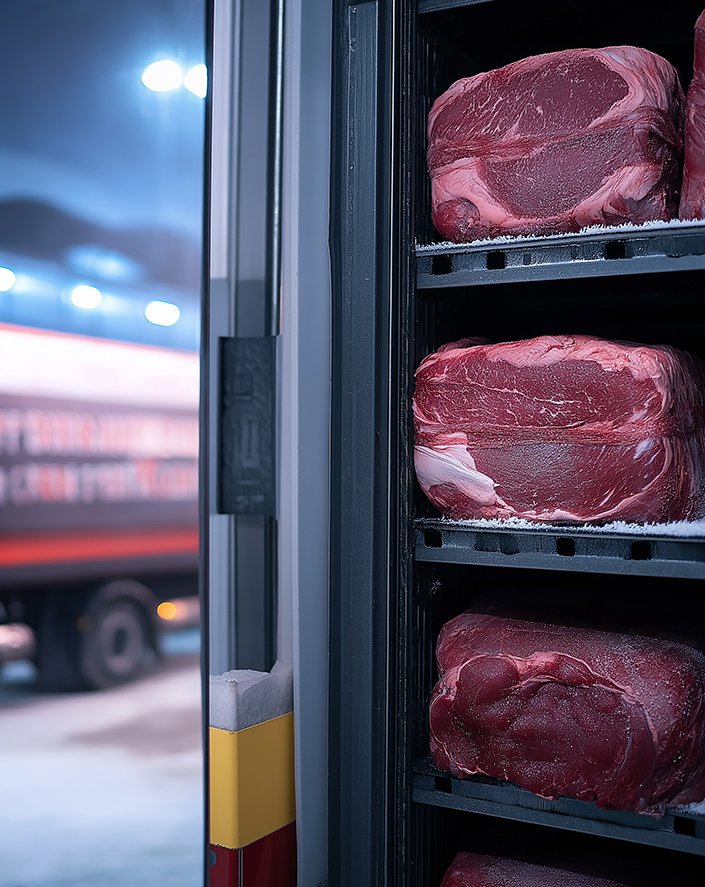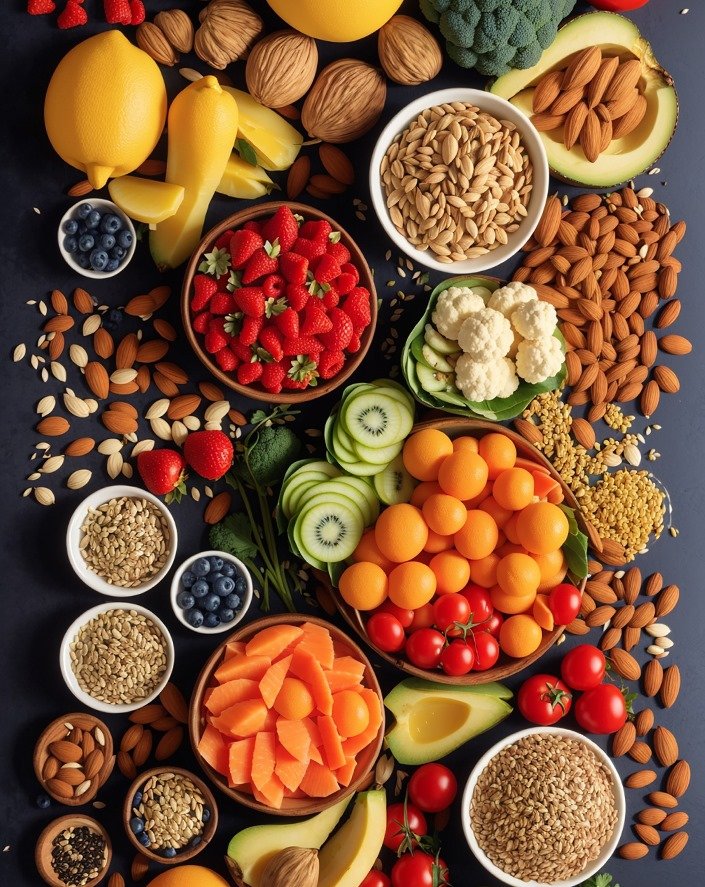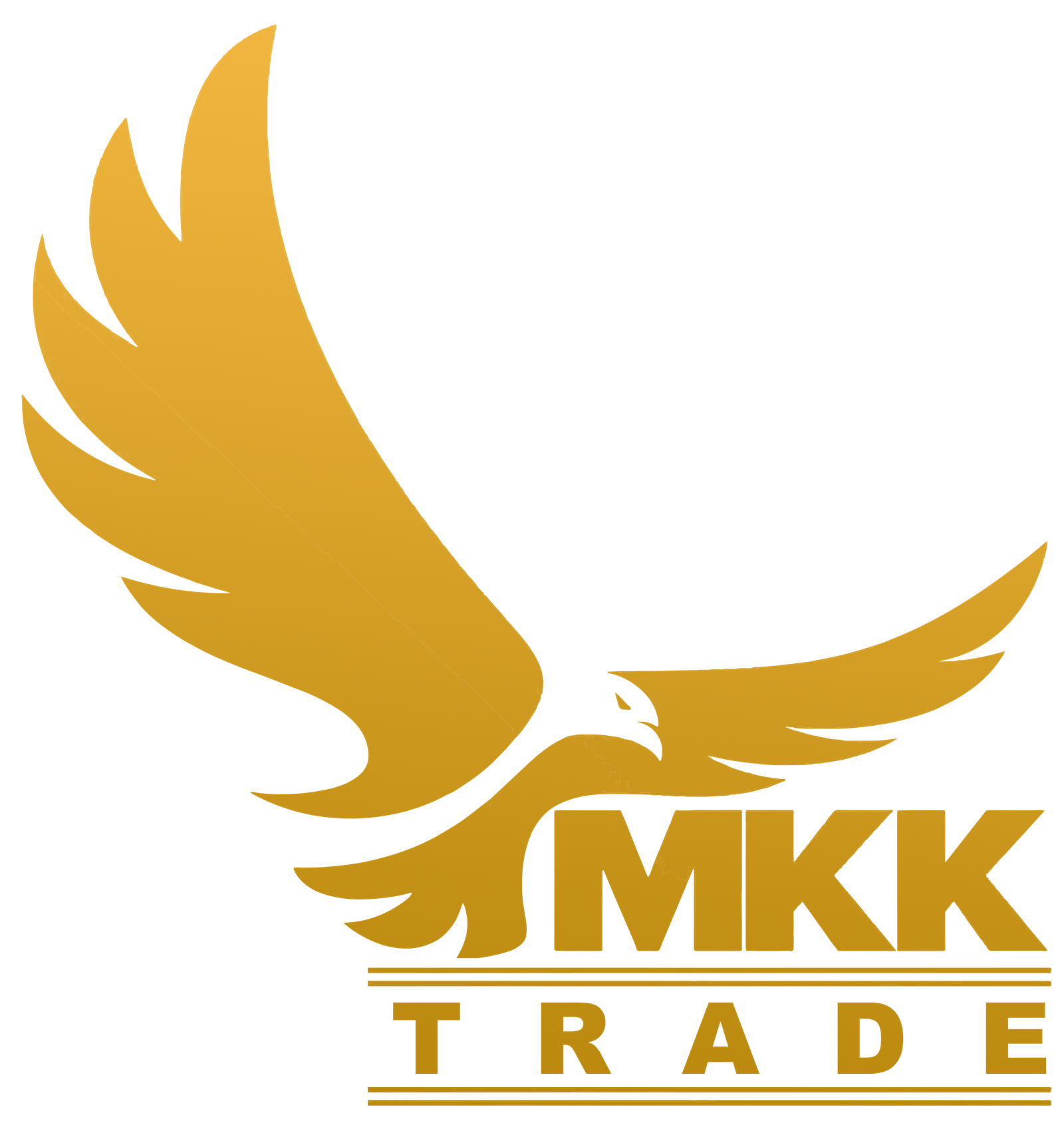Office #207-2nd Floor-ZALFA BUILDING-NEAR Jumeirah Creekside Hotel-Garhoud -Dubai UAE
Meat Exporter in UAE MKK TRADE-Your Trusted Potato Exporter in the UAE
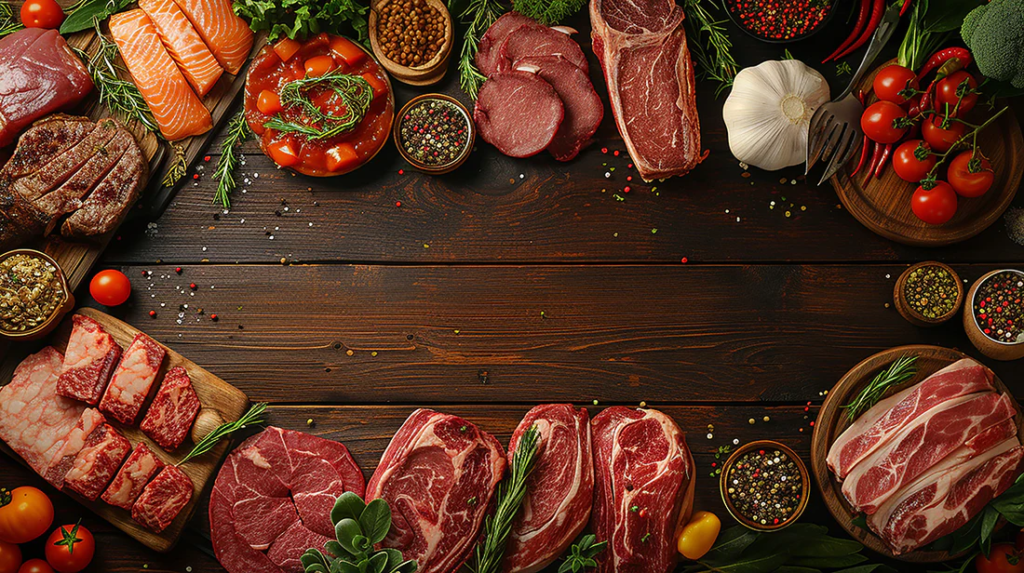
MKK TRADE is a leading meat exporter in the UAE, providing premium beef, lamb, and poultry to global markets. Known for its stringent quality control and adherence to international safety standards, the company guarantees fresh, halal-certified products.
MKK TRADE’s robust logistics and cold storage systems ensure efficient and timely delivery, reinforcing its status as a dependable supplier in the meat export industry. Known for its commitment to quality, MKK TRADE sources meat from trusted suppliers, ensuring that all products meet rigorous health and safety standards. This dedication to quality has earned the company a strong reputation among its clientele, who trust MKK TRADE for providing fresh, high-grade meat.
As a meat exporter, MKK TRADE handles various types of meat, including beef, lamb, and poultry. The company ensures that all exports comply with the necessary regulations and certifications, particularly for markets that demand halal-certified products. By maintaining strict adherence to global food safety standards, MKK TRADE meets the specific needs of its international clients while maintaining strong relationships with suppliers across the UAE and beyond.
The logistics involved in meat exportation are crucial, and MKK TRADE has developed an efficient cold-chain management system to ensure that meat products remain fresh throughout their journey. This system, combined with their focus on timely delivery, has allowed the company to maintain its standing as a reliable exporter. As demand for high-quality meat continues to grow, MKK TRADE’s strategic approach to export logistics enables it to meet the evolving needs of its global customers.
MKK TRADE’s specialties in meat exporting focus on key features that distinguish their products in the global market:
Halal Certification – MKK TRADE ensures that all meat exports, including beef, lamb, and poultry, are halal-certified, meeting the requirements of markets that demand religiously compliant products.
Premium Quality – The company emphasizes the selection of top-grade meats, sourced from reputable suppliers who adhere to strict quality and safety standards, ensuring superior taste and texture.
Freshness Guaranteed – Utilizing advanced cold-chain logistics, MKK TRADE ensures that all meat exports are preserved in optimal conditions, maintaining freshness from processing to final delivery.
Customizable Packaging – MKK TRADE offers flexibility with customizable cuts and packaging options, allowing them to meet the specific needs of their clients, from retailers to large-scale food service providers.
Global Reach – The company’s strong distribution network enables them to export meat to various international markets, providing reliable, timely deliveries while maintaining high product quality.
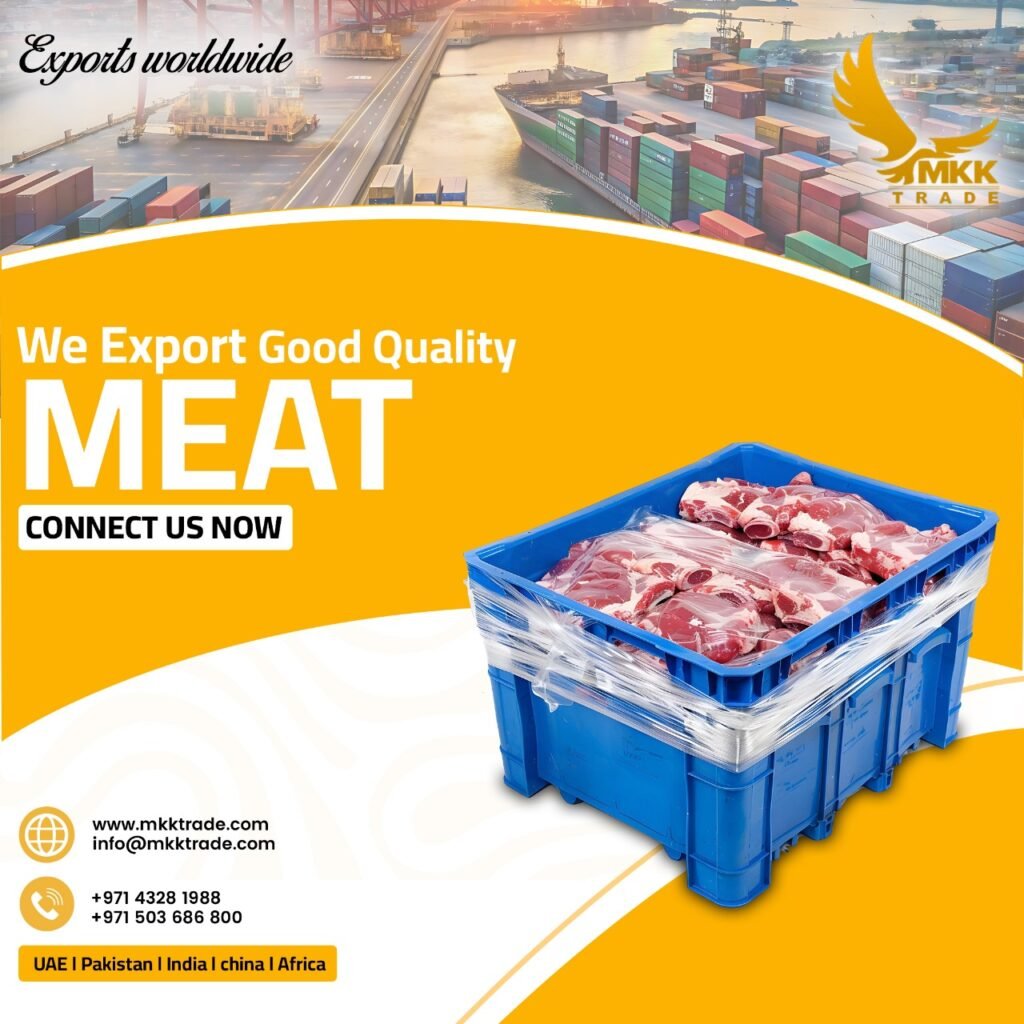
Meat serves a variety of important uses in culinary, nutritional, economic, and cultural contexts. One of the primary culinary uses of meat is as a protein source, essential for muscle growth, repair, and overall health. Different types of meat, such as beef, chicken, lamb, and pork, bring unique flavors and textures to dishes, enhancing the diversity of culinary options available. In many cultures, meat forms the foundation of traditional dishes, such as steak in American cuisine, kebabs in Middle Eastern meals, and dumplings in Asian cooking, showcasing its central role in global gastronomy.
Nutritionally, meat is a significant contributor of essential vitamins and minerals. It provides critical nutrients such as B vitamins, particularly B12, iron, zinc, and selenium, which are vital for various bodily functions, including energy production and immune system support. Additionally, certain meats, especially fish, contain healthy fats, including omega-3 fatty acids, which promote heart health and overall well-being. These nutritional benefits make meat an integral part of a balanced diet for many people around the world.
Economically, the meat industry is a vital sector that creates numerous jobs in farming, processing, distribution, and retail. This industry significantly contributes to local and national economies, providing livelihoods for millions and supporting agricultural practices. Moreover, meat is a key export commodity for many countries, driving international trade and economic growth while catering to global consumer demand.
In recent years, the culinary landscape has evolved to include innovative uses of meat. Chefs and food enthusiasts explore various cuts and cooking techniques, leading to the creation of gourmet dishes that push culinary boundaries. Additionally, the growing interest in sustainable and plant-based meat alternatives reflects changing consumer preferences, showcasing how meat remains versatile in traditional and modern cuisines alike. This ongoing innovation highlights the importance of meat not only as a food source but also as a cultural and economic pillar in societies worldwide.
Fresh meat suppliers UAE Buy meat in bulk UAE Halal meat exporter UAE Best meat exporter Dubai UAE meat wholesale Organic meat exporter UAE Export quality meat UAE Frozen meat supplier UAE Bulk meat export UAE Meat import/export UAE Halal mutton supplier UAE Fresh mutton exporter UAE Mutton exporters in UAE Halal beef supplier UAE Fresh beef exporter UAE UAE mutton wholesale market Frozen mutton distributor UAE Organic mutton supplier UAE Export quality mutton UAE Mutton and beef wholesale UAE UAE beef export services Best mutton exporter Dubai UAE beef wholesale suppliers Top mutton exporters UAE Halal beef and mutton UAE UAE beef suppliers in bulk Frozen beef supplier UAE Grass-fed beef exporter UAE Organic beef exporter UAE UAE beef and mutton trading UAE meat distribution companies Mutton and beef supply chain UAE Halal meat export services UAE UAE beef and mutton import/export Top beef exporters UAE Mutton and beef export quality UAE UAE halal meat suppliers Fresh beef and mutton UAE Meat wholesale market UAE Culinary Uses: Protein Source: Meat is a primary source of protein, essential for muscle growth, repair, and overall health. Flavor and Texture: Different types of meat add unique flavors and textures to dishes, enhancing culinary diversity. Cultural Dishes: Many traditional and cultural cuisines rely heavily on meat, such as steak in American cuisine, lamb in Middle Eastern dishes, and pork in Asian cooking. Food Products: Processed Meats: Meat is often processed into products like sausages, bacon, ham, and deli meats, which are popular for their convenience and taste. Canned and Packaged Goods: Canned meats and ready-to-eat meals utilize meat for quick meal solutions. Nutritional Value: Meat Exporter in UAE Meat Exporter in UAE Meat Exporter in UAE Meat Exporter in UAE Meat Exporter in UAE Meat Exporter in UAE Meat Exporter in UAE Meat Exporter in UAE Meat Exporter in UAE Meat Exporter in UAE Meat Exporter in UAE Meat Exporter in UAE Meat Exporter in UAE Meat Exporter in UAE Meat Exporter in UAE Meat Exporter in UAE Meat Exporter in UAE Meat Exporter in UAE Meat Exporter in UAE Meat Exporter in UAE Meat Exporter in UAE Meat Exporter in UAE Meat Exporter in UAE Meat Exporter in UAE VVV Meat Exporter in UAE Meat Exporter in UAE Meat Exporter in UAE Meat Exporter in UAE Meat Exporter in UAE Meat Exporter in UAE Meat Exporter in UAE Meat Exporter in UAE Meat Exporter in UAE Meat Exporter in UAE Meat Exporter in UAE Meat Exporter in UAE Meat Exporter in UAE Meat Exporter in UAE Meat Exporter in UAE Meat Exporter in UAE Meat Exporter in UAE Vitamins and Minerals: Meat provides essential nutrients, including B vitamins (like B12), iron, zinc, and selenium, contributing to a balanced diet. Healthy Fats: Certain meats, particularly fish, offer healthy fats, including omega-3 fatty acids, which are beneficial for heart health. Economic Uses: Industry and Employment: The meat industry creates jobs in farming, processing, distribution, and retail, contributing significantly to local and national economies. Trade: Meat is a significant export commodity for many countries, supporting international trade and economic growth. Culinary Innovation: Gastronomy: Chefs experiment with different cuts and cooking techniques to create gourmet dishes, enhancing the culinary landscape. Meat Alternatives: Growing interest in sustainable and plant-based meat alternatives reflects changing consumer preferences while maintaining the culinary uses of meat in various cuisines. These uses demonstrate the versatility and importance of meat in our diets, economies, and cultures. Here are some interesting facts about meat: Types of Meat: There are several types of meat, including red meat (beef, lamb, pork), white meat (chicken, turkey), and processed meat (ham, bacon, sausages). Each type has its unique flavor profile and nutritional content. Nutritional Value: Meat is a rich source of high-quality protein, essential amino acids, and important nutrients such as iron, zinc, and B vitamins (especially vitamin B12), which are crucial for energy production and maintaining healthy nerve function. Meat Consumption Trends: Global meat consumption has been steadily increasing, with countries like China and the United States being the largest consumers. The rise in demand for meat is often associated with economic development and changing dietary preferences. Sustainability Concerns: The meat industry faces scrutiny over its environmental impact, including greenhouse gas emissions, land use, and water consumption. Efforts are underway to promote sustainable meat production and alternative protein sources, such as plant-based meats. Culinary Versatility: Meat is incredibly versatile and can be prepared in numerous ways, including grilling, roasting, frying, braising, and smoking. Different cooking techniques can enhance flavors and textures, making meat a popular choice in cuisines worldwide. Cultural Significance: Meat plays a vital role in many cultural and religious practices. For example, certain meats are essential in traditional celebrations, such as roast lamb during Easter or turkey during Thanksgiving in the United States. Historical Importance: The domestication of animals for meat dates back thousands of years. Historical records suggest that humans began domesticating livestock around 10,000 years ago, marking significant developments in agriculture and food systems. Health Considerations: While meat is a valuable part of many diets, moderation is important. Some studies suggest that high consumption of red and processed meats may be linked to health risks, including heart disease and certain cancers. As a result, dietary guidelines often recommend balancing meat intake with plant-based foods. These facts highlight the complexity of meat consumption and its significance in nutrition, culture, Here are the key standards associated with meat production, processing, and exportation: Food Safety Standards: HACCP (Hazard Analysis Critical Control Point): A systematic preventive approach to food safety that identifies physical, chemical, and biological hazards in production processes. This standard helps ensure that meat products are safe for consumption. ISO 22000: An international standard that outlines the requirements for a food safety management system, including effective communication and risk management throughout the food supply chain. Halal Certification: Halal standards ensure that meat products meet Islamic dietary laws. Certification involves specific slaughtering practices and processing methods that comply with halal requirements, making these products suitable for Muslim consumers. Quality Assurance Standards: ISO 9001: A widely recognized standard that outlines the criteria for a quality management system. It ensures consistent quality in products and services, improving customer satisfaction in meat production and processing. Meat Standards Australia (MSA): A set of standards that provide guidelines for meat quality assessment and grading, ensuring that the meat meets consumer expectations in terms of tenderness, flavor, and juiciness. Animal Welfare Standards: Various animal welfare standards, such as the Animal Welfare Act in many countries, establish guidelines for the humane treatment of animals throughout the meat production process. These standards focus on proper handling, housing, and transportation of livestock. Traceability Standards: Many countries implement traceability systems that track meat products from farm to table. This ensures transparency in the supply chain, enabling consumers to know the origin of their meat and fostering trust in the products they purchase. Environmental Standards: Sustainable meat production is increasingly governed by environmental standards that address the ecological impact of farming practices. These standards encourage practices that minimize carbon emissions, water use, and land degradation. Regulatory Compliance: Each country has specific regulations regarding meat processing and exportation, often enforced by governmental agencies (e.g., the USDA in the United States or the EFSA in Europe). These regulations cover hygiene, labeling, and import/export requirements. These standards play a crucial role in ensuring that meat products are safe, high-quality, and ethically produced, addressing the concerns of consumers, regulatory bodies, and the meat industry as a whole. Here are some common myths about meat, along with the facts that debunk them: Myth: All meat is unhealthy. Fact: Meat can be a healthy part of a balanced diet. It is a rich source of high-quality protein, essential vitamins (like B12), and minerals (such as iron and zinc). Moderation and choosing lean cuts can make meat a nutritious option. Myth: Red meat causes cancer. Fact: While some studies suggest a correlation between high consumption of processed and red meats and certain cancers, the overall risk is influenced by various factors, including overall diet, lifestyle, and genetics. Consuming red meat in moderation as part of a balanced diet is generally considered safe. Myth: Eating meat is bad for the environment. Fact: While meat production does have environmental impacts, sustainable farming practices and responsible meat consumption can mitigate these effects. Not all meat production is equal; certain methods are more environmentally friendly than others. Myth: Meat is the only source of protein. Fact: While meat is a significant source of protein, there are many other protein-rich foods, including beans, lentils, nuts, seeds, and dairy products. A well-planned vegetarian or plant-based diet can provide ample protein without meat. Myth: You can’t get enough iron without meat. Fact: While meat, especially red meat, is a good source of heme iron, non-meat sources (like beans, lentils, tofu, and fortified cereals) also provide iron, albeit in a non-heme form, which is less easily absorbed. Pairing these foods with vitamin C-rich foods can enhance iron absorption. Myth: All processed meats are unhealthy. Fact: Not all processed meats are created equal. While many processed meats can be high in sodium and preservatives, some options, like lean turkey or chicken sausages, can be healthier choices. It's essential to read labels and choose minimally processed products when possible. Myth: Grass-fed meat is always healthier than grain-fed meat. Fact: Grass-fed meat may have higher omega-3 fatty acids and certain vitamins compared to grain-fed meat. However, the nutritional differences can vary based on various factors, including the specific animal's diet and farming practices. Myth: Free-range and organic meat is always better. Fact: While free-range and organic labels often indicate higher animal welfare standards and fewer antibiotics, they don’t necessarily guarantee higher nutritional value. It's essential to research and understand what these labels mean and their implications for animal treatment and environmental practices. Understanding these myths and their corresponding facts can help consumers make informed decisions about meat consumption and its role in a healthy diet. MKK TRADE plays a significant role in the meat exporting industry, leveraging its expertise and strategic practices to meet the demands of global markets. Here’s a detailed look at its relevance in exporting meat: Quality Assurance: MKK TRADE prioritizes high-quality meat products by sourcing from reputable suppliers and adhering to strict quality control standards. This commitment to quality ensures that customers receive meat that is not only safe but also flavorful and tender, making it a trusted name in meat exports. Halal Certification: As a company focusing on halal meat exports, MKK TRADE is well-positioned to serve markets that require halal-certified products. This certification not only opens doors to Muslim-majority countries but also caters to consumers seeking ethically sourced meat, enhancing its market reach. Diverse Product Range: MKK TRADE offers a variety of meat products, including beef, lamb, and poultry, providing customers with options that cater to different tastes and culinary needs. This diversity allows the company to serve various sectors, including retail, food service, and processing industries. Strong Global Network: The company has established a robust distribution network, enabling it to efficiently reach international markets. This global reach is crucial in a competitive meat export landscape, allowing MKK TRADE to fulfill orders in a timely manner and maintain customer satisfaction. Compliance with Standards: MKK TRADE ensures compliance with international food safety and quality standards, such as HACCP and ISO certifications. By adhering to these standards, the company reinforces its reputation as a reliable exporter, assuring clients of the safety and quality of its products. Sustainable Practices: As consumer awareness of sustainability grows, MKK TRADE’s commitment to responsible sourcing and sustainable practices enhances its relevance in the market. By focusing on environmentally friendly practices, the company appeals to a broader audience that prioritizes sustainability in their purchasing decisions. Adapting to Market Trends: MKK TRADE remains agile in adapting to changing market trends and consumer preferences, including the rising demand for healthier and ethically sourced meat products. By staying attuned to these shifts, the company positions itself as a forward-thinking exporter capable of meeting evolving consumer needs. In summary, MKK TRADE’s relevance in the meat export industry is underscored by its commitment to quality, adherence to standards, diverse product offerings, and responsiveness to market dynamics. These factors not only establish it as a key player in the meat export sector but also contribute to its continued growth and success in a competitive landscape. Here are some key facts about MKK TRADE from a customer perspective, emphasizing what makes the company an attractive choice for meat exports: High-Quality Products: MKK TRADE is committed to sourcing and supplying premium-quality meat products. Customers can expect consistent freshness, flavor, and texture in all offerings, ensuring satisfaction with every purchase. Halal Certification: For customers seeking halal options, MKK TRADE provides a range of halal-certified meats. This certification guarantees that the meat meets Islamic dietary laws, making it suitable for Muslim consumers and enhancing its appeal in diverse markets. Diverse Product Range: Customers can choose from a wide variety of meat products, including beef, lamb, chicken, and processed meats. This diversity allows clients to find specific cuts or types that cater to their culinary needs and preferences. Sustainability Commitment: MKK TRADE focuses on sustainable sourcing and environmentally friendly practices. Customers concerned about the ecological impact of their food choices can feel confident that they are supporting a company that prioritizes sustainability. 1. Types of Exported Meat Beef: High demand in countries like China, the USA, and the Middle East. Poultry: Chicken and turkey dominate meat exports due to affordability and versatility. Lamb and Mutton: Popular in regions with dietary preferences like the Middle East and North Africa. Pork: Heavily traded in markets like Europe and East Asia. Processed Meats: Sausages, frozen products, and ready-to-eat items have growing demand globally. 2. Key Exporting Countries Brazil: The largest exporter of beef and poultry. Australia and New Zealand: Leaders in lamb and mutton exports. USA: Major supplier of beef and poultry worldwide. India: A significant exporter of buffalo meat. European Union: Known for pork and specialty meats. 3. Applications of Exported Meat Food Industry: Restaurants, fast food chains, and supermarkets are primary consumers. Cultural and Religious Needs: Halal and kosher meat exports cater to specific dietary requirements. Processed Foods: Ingredients for frozen meals, canned goods, and ready-to-eat snacks. 4. Emerging Trends in Meat Exporting Sustainability: Focus on eco-friendly farming and carbon-neutral logistics. Halal and Kosher Markets: Expanding to meet rising demand in the Middle East and Southeast Asia. Value-Added Products: Increasing preference for processed and convenience-focused meat products. Alternative Proteins: Growing competition from plant-based and lab-grown meats. 5. Challenges in Meat Exporting Trade Barriers: Tariffs, quotas, and trade regulations vary between regions. Health and Safety Standards: Compliance with food safety protocols like HACCP and ISO. Logistics: Managing cold chain transportation for perishable products. Meat exporting remains a dynamic and profitable industry, meeting the growing global demand for high-quality protein while adapting to changing market trends and consumer preferences.
